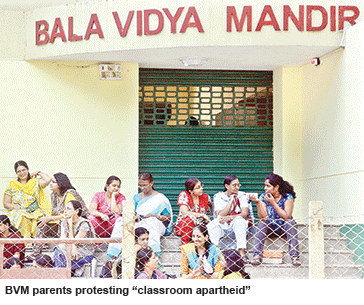 An uneasy calm prevails on the campus of the CBSE-affiliated Bala Vidya Mandir Senior Secondary School (BVM, estb. 1989) in Adyar, Chennai. In early June the school’s 104 teachers, parents, principal Srinivasa Raghavan and former school CEO S.S. Nathan rose in united protest against a dual fee structure introduced by the management for its 1,200 students. According to a circular issued on May 25 by the management headed by managing trustee Ramanna Prasad, parents were given the option to pay management-fixed fees which would entitle their children to extra services, participation in school functions and extra-curricular activities, or the tuition fees adjudicated by the Justice Singaravelu Private School Fee Determination Committee (JSPSFDC), which would entitle students to a minimum school time of 4.54 hours per day for 220 working days without access to co-curricular and extra-curricular education facilities.
An uneasy calm prevails on the campus of the CBSE-affiliated Bala Vidya Mandir Senior Secondary School (BVM, estb. 1989) in Adyar, Chennai. In early June the school’s 104 teachers, parents, principal Srinivasa Raghavan and former school CEO S.S. Nathan rose in united protest against a dual fee structure introduced by the management for its 1,200 students. According to a circular issued on May 25 by the management headed by managing trustee Ramanna Prasad, parents were given the option to pay management-fixed fees which would entitle their children to extra services, participation in school functions and extra-curricular activities, or the tuition fees adjudicated by the Justice Singaravelu Private School Fee Determination Committee (JSPSFDC), which would entitle students to a minimum school time of 4.54 hours per day for 220 working days without access to co-curricular and extra-curricular education facilities.
The week-long protest against the BVM management’s dual fee structure, widely condemned by print, television and social media as “classroom apartheid”, was called off after the management scrapped the proposal on June 7 and agreed to reinstate principal Srinivasa Raghavan, who had been transferred to the BVM Global School in Bollineni Hillside, Chennai, for participating in the protest. However, the school’s CEO S.S. Nathan, whose services were terminated for protesting and also accusing the management of financial impropriety, has not been reinstated.
Nevertheless, it’s patently clear that the provocation for introducing the dual fee structure in BVM, Adyar was a direct fallout of the chaos and confusion caused by state government interference with private unaided (financially independent) schools. Ever since the erstwhile DMK government enacted the Tamil Nadu Schools (Regulation and Collection of Fee) Act, 2009, three private school fee determination committees have been constituted to regulate tuition fees of the state’s 5,934 private K-12 matriculation schools (unique to Tamil Nadu) and 5,000 nursery-primaries affiliated with the Tamil Nadu State Board of Secondary Education.
Typically, instead of focusing their attention on raising teaching-learning standards in Tamil Nadu’s 52,303 government-run schools to enable them to compete for middle class students who overwhelmingly prefer private K-12 education, successive state governments have sought to curry favour with the politically influential middle class by regulating the tuition fees of private schools. This year, the state government extended the jurisdiction of JSPSFDC to also regulate the state’s 580 CBSE and 52 CISCE-affiliated schools.
“Most private school managements are dissatisfied with the tuition fees determined by fees committees. Tuition fees are arbitrarily fixed without taking into consideration salaries and increments paid to teachers and staff, co-curricular and extra-curricular education and infrastructure facilities provided. The regulation of tuition fees in private schools is best left to PTAs (parent-teacher associations),” says Dr. C. Satish, director, Paavai Group of Schools, Namakkal.
The silver lining for private school managements is that even if belatedly, the hitherto economics-ignorant judiciary is beginning to appreciate that high-quality holistic education cannot be provided at rock-bottom prices. In a writ petition filed by the Tiruvottriyur-based Kavi Bharathi Vidyalaya against an order of JSPSFDC, a division bench of the Madras high court observed: “When extra-curricular activities are conducted by private, unaided schools beyond school hours, and when they are wholly unconnected with the course of study, it cannot be interfered with by the state or the fee committee on the assumption that they are connected with curriculum or academic activities.”
The high court’s ambiguous judgement offers some hope to beleaguered private school managements struggling to balance the contradictory demands of parents for first world education at third world prices. Yet the greater tragedy is that winning courtroom battles and appeals — rather than education excellence — has become the prime focus of school managements in a state which prides itself for its high literacy and excellent standards of K-12 education.
Hemalatha Raghupathi (Chennai)